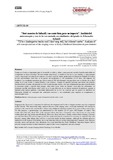Mostrar el registro sencillo del ítem
"Seré maestra de Infantil y no canto bien, pero no importa": análisis del autoconcepto y uso de la voz cantada en estudiantes del grado de Educación Infantil
| dc.creator | Gassull, Cecilia | es_ES |
| dc.creator | Lorenzo de Reizábal, Arantza | es_ES |
| dc.creator | González Sanvisens, Laura | es_ES |
| dc.date.accessioned | 2024-02-22T10:02:08Z | |
| dc.date.available | 2024-02-22T10:02:08Z | |
| dc.date.issued | 2023 | |
| dc.identifier.citation | Gassul, C., Lorenzo de Reizábal, A., González-Sanvisens, L. (2023) "Seré maestra de Infantil y no canto bien, pero no importa": Análisis del autoconcepto y uso de la voz cantada en estudiantes del grado de Educación Infantil. Revista Electrónica de LEEME, 52, 38-52. https://doi.org/10.7203/LEEME.52.26823. | es_ES |
| dc.identifier.issn | 1575-9563 | |
| dc.identifier.uri | https://hdl.handle.net/2454/47553 | |
| dc.description | Versión en castellano e inglés | es_ES |
| dc.description.abstract | Cantar en el aula es importante para el desarrollo de niños y niñas y para que esto suceda el profesorado debe ser competente en dicha actividad. En este estudio transversal, se analiza el uso de la voz cantada, el autoconcepto vocal y emocional con relación al contexto y la salud vocal del futuro profesorado de Educación Infantil (0-6 años) de tres universidades. Para ello, se ha pasado un cuestionario a 240 estudiantes (22-45 años; 200 mujeres; 40 hombres). Los resultados muestran que sólo en torno al 30% del alumnado cree que tiene una voz bonita, les es fácil cantar en el tono escrito y cantan afinado y sin esfuerzo. Aunque en aquellas personas que tienen un contexto familiar donde el cantar está presente no solo el autoconcepto mejora, sino que comprenden que para el profesorado es necesario cantar y hacerlo bien porque, entre otras cosas, serán un modelo vocal para sus estudiantes. El alumnado percibe tener buena salud vocal, no es lo que observan en sus tutoras-mentoras de prácticas, quienes a menudo usan música grabada y presentan alteraciones de la voz. Se concluye que los grados de maestro/a en Educación Infantil no consiguen dar suficientes recursos a sus estudiantes para mejorar su competencia y autoconcepto vocal. | es_ES |
| dc.description.abstract | Singing in the classroom is important for children's development and for this to happen teachers must be competent in this activity. This transversal study analyses the use of the singing voice, vocal and emotional self-concept in relation to the context and vocal health of future early childhood education teachers (0-6 years) at three universities. For this purpose, a questionnaire was administered to 240 students (22-45 years; 200 females; 40 males). The results show that only about 30% of the students believe they have a beautiful voice, find it easy to sing in the written pitch and sing in tune and effortlessly. However, those who have a family context where singing is present, not only does their self-concept improve, but also understand that for a teacher it is necessary to sing and sing well, because, among other things, they will be a vocal role model for their students. Although the students perceive themselves to be in good vocal health, this is not what they observe in their internship tutors-mentors, who often use recorded music and present voice alterations. It is concluded that the Early Childhood Education degrees fail to provide enough resources to their students to improve their vocal competence and self-concept. | en |
| dc.format.mimetype | application/pdf | en |
| dc.language.iso | spa | en |
| dc.publisher | Universitat de Valencia | es_ES |
| dc.relation.ispartof | Revista Electrónica de LEEME, 52, 38-52 | es_ES |
| dc.rights | Creative Commons BY-NC-SA 4.0 DEED Atribución-NoComercial-CompartirIgual 4.0 Internacional | es |
| dc.rights.uri | http://creativecommons.org/licenses/by-nc-sa/4.0/deed.es | |
| dc.subject | Autoconcepto | es_ES |
| dc.subject | Canto | es_ES |
| dc.subject | Formación inicial | es_ES |
| dc.subject | Salud vocal | es_ES |
| dc.subject | Self-concept | en |
| dc.subject | Singing | en |
| dc.subject | Initial training | en |
| dc.subject | Voice health | en |
| dc.title | "Seré maestra de Infantil y no canto bien, pero no importa": análisis del autoconcepto y uso de la voz cantada en estudiantes del grado de Educación Infantil | es_ES |
| dc.title.alternative | “I'll be a kindergarten teacher and I don't sing well, but it doesn't matter". Analysis of self-concept and use of the singing voice in Early Childhood Education degree students | en |
| dc.type | Artículo / Artikulua | es |
| dc.type | info:eu-repo/semantics/article | en |
| dc.date.updated | 2024-02-22T09:50:20Z | |
| dc.contributor.department | Ciencias Humanas y de la Educación | es_ES |
| dc.contributor.department | Giza eta Hezkuntza Zientziak | eu |
| dc.rights.accessRights | Acceso abierto / Sarbide irekia | es |
| dc.rights.accessRights | info:eu-repo/semantics/openAccess | en |
| dc.identifier.doi | 10.7203/LEEME.52.26823 | |
| dc.relation.publisherversion | https://doi.org/10.7203/LEEME.52.26823 | |
| dc.type.version | Versión publicada / Argitaratu den bertsioa | es |
| dc.type.version | info:eu-repo/semantics/publishedVersion | en |




